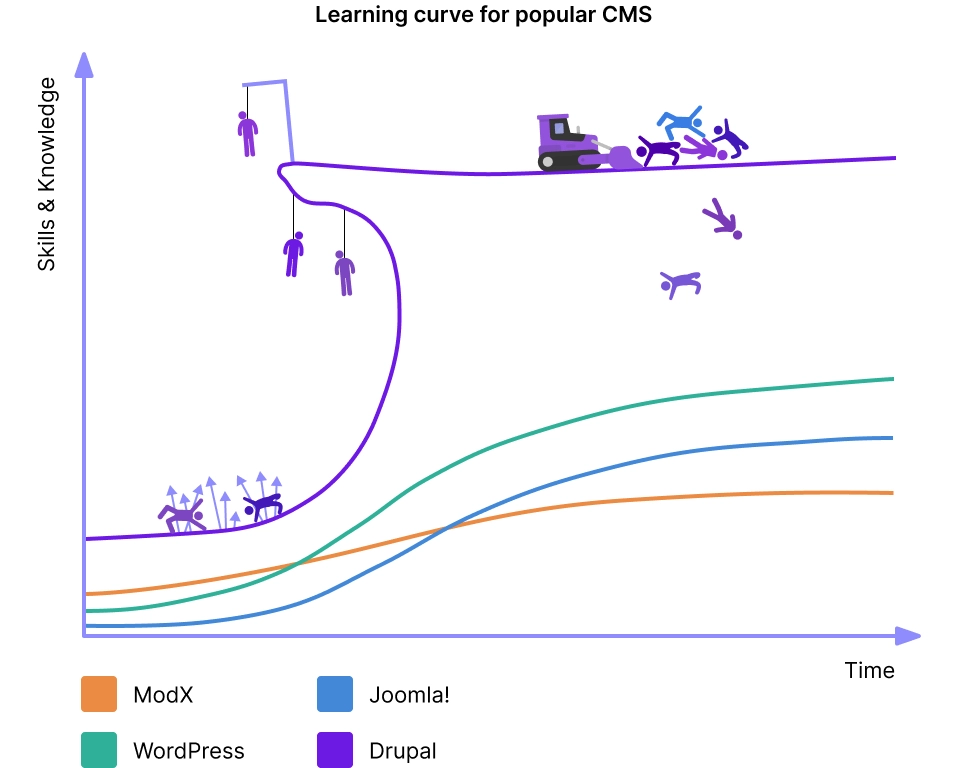On January 15, 2024 Drupal turns 23!

Being our content management system of choice we couldn’t help but celebrate this joyful occasion by taking a look back at its road so far. In doing so we decided to talk to our colleagues at Attico whose daily job is to develop for Drupal and asked them what they think of the platform, the community, and the future that lies ahead of it.
It turns out that most of them have known and worked with Drupal for quite a while, averaging at around 10 years of hands-on experience. And this is no wonder — having become a very mature piece of technology throughout the past 23 years Drupal has gathered and retained an enormous community of IT enthusiasts from all over the globe counting more than 1,000,000 developers, designers, trainers, strategists, coordinators, editors, and sponsors working together to make the best open source CMS possible. In fact, its community is one of the biggest open source communities throughout the world and it’s been that way for probably well over a decade now.
Yet, the competition has always been fierce. Take a look for yourself: WordPress, Joomla, CMS Hub, Crownpeak, Contentstack, Optimizely, Magnolia, Contentful, Storyblok, Webflow, concrete5, TYPO3 and a whole bunch of e-commerce solutions all pushed hard against Drupal in the race for the title of the most beloved content management platform. So, how come developers still opt for Drupal in this endless sea of IT opportunities? Well, it’s the:
Indeed, the Drupal community we’ve talked about isn’t just a handful of people united under a single tech umbrella — all being active contributors to Drupal, both its core and a vast ecosystem of modules, they also care for one another when it comes to professional help, development, and education. This peer support, sharing and caring is what helps the platform attract newbies and keep up the passion with the oldies.
Besides, the contributions made to the core and the module ecosystem render the solution of a decent portion of the business problems faced by the Drupal owners a no-brainer: you can either achieve what’s needed out of the box or you can cherry-pick a module that suits your needs best. Then it’s the more interesting and challenging tasks that need to be addressed and this is where the developers truly kick in. This layer of abstraction from trivial tasks is appealing to software engineers as they easily prefer complexity over mundanity. And this is what drives software development companies and website owners towards Drupal too: the ability to spin up a working instance of a basic website architecture with flexible content and user management flows in a few clicks, enhance its functionality with ready-made modules in a few more clicks, and then focus on the unique requirements and business-specific features is a blast. In fact, this is how some of the companies our developers used to work for in the beginning of their careers started their Drupal journey:
But Drupal’s capabilities spread way beyond its configurability, and featurefullness. Even when it was much younger than today it never ceased to amaze people how few troubles and how many more advantages compared to other systems it had. Take architecture, for instance: it was far more stable than Joomla; or semantics: being a CMS for blogging only all WordPress extensions felt alien to the platform itself. Drupal’s never did.
However, this all came and still comes at a hefty price: not all people can cope with the dramatic learning curve that Drupal has. I bet you have probably seen this picture, haven’t you?

The difficulties associated with getting into Drupal are arguably the most common sentiment among developers. The infinitely flexible framework with сomplex content types and taxonomies, and drastic changes every now and then is a storming sea to navigate across: introduction of Twig, the switch to OOP, the shift to the API-first approach, radical changes in the UI — these are only a few of the changes the platform has undergone… just between versions 7 and 8! Yet, those who master Drupal and withstand its dynamics tend to remain loyal to it forever despite this drama.
So, what’s been helping us all remain sane and keep pace with the everchanging Drupal landscape all this time? Well, it’s the infinite amount of conferences, meetups, books, media and alike that document and share our experiences, worries, failures and successes: Drupal Camps, Drupal Cafés, the one and only DrupalCon, Drupal Developer Days, the Drupal Association channel on YouTube, the Drupal channel on Slack, and, of course, drupal.org. And they all forecast a very bright future too: the strategic initiatives adopted for the next editions of Drupal’s core keep the focus on helping Drupal remain relevant in the market while enhancing the editorial, developer, and customer experiences relative to its competitors.
To us it seems that Drupal has already succeeded at all of this. As one of our devs put it:
With this in mind, if you have already settled on Drupal but are among the lucky ones who is yet to grasp its inherent beauty and magic, then rest assured that you’ve made the right choice. And today, on Drupal’s 23rd birthday, you’ll probably be making it the best present ever — enlarging its thriving community and making it prosper. If so, here are a few tips for you to get started and succeed:
► Read the official docs carefully;
► Study the code of the core and popular modules;
► Comprehend the importance of ubiquitous language, meanings and coding standards;
► Stick to the Drupal-way of doing things while thinking out of the box;
► Make a site-builder pet-project;
► Practice with your own modules.
We will leave you at that for now — you’ve 23 years to catch up to! As for us, we would like to give Drupal a fair share of our compliments and thank it for being the solid and irreplaceable cornerstone of our business.
Happy Birthday, Drupal! Here’s to the next 23 years! 🥂